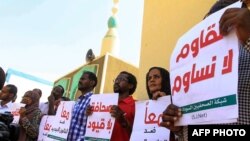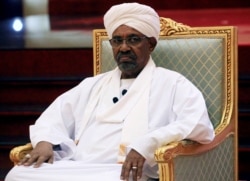Plans by Sudan’s army to file legal complaints against journalists for cyber libel and “insulting” the armed forces have echoes of the intimidation tactics used under the rule of ousted President Omar al-Bashir, local reporters say.
In a statement last month, the armed forces said a cybercrime military commissioner had been appointed. The commissioner, working under the military prosecutor, will monitor and document “insults” against the army, and any violations will result in criminal complaints brought against journalists in Sudan or outside its borders.
The army said the measure was needed because of “systemic attacks and accusations” against the Sudanese military.
The military is part of Sudan’s transitional government. A Sovereign Council, made up of six civilians and five military members, was set up to help the country return to civilian rule following the ouster of Bashir last year after mass protests.
“It looks like the government is following the same path that the previous regime had followed, of stifling press freedom and silencing their critics,” Ravi Prasad, advocacy director at the media network International Press Institute, told VOA. “The army seems to be very, very sensitive to any kind of criticism, and the new law they’re trying to bring in would completely stifle press freedom in the country.”
Aside from the army statement, the Ministry of Justice on July 10 announced several legal amendments — including more severe penalties under the cybercrime law to protect privacy and prevent the spread of rumors and harmful information.
The Sudanese Embassy in Washington said it would provide comment but did not respond to VOA’s follow-up calls.
Government should 'mend their ways'
Prasad said the army statement and cybercrime law were vaguely worded and open to interpretation, including on what constitutes insult or false news.
“It is the right of journalists to report, and journalists speak truth to power. If the government of Sudan is sensitive to criticism, they should try to mend their ways rather than try to arrest journalists and stifle their voices,” he said. “Appointing a military commissioner to deal with media freedom is something that is unheard of.”
Khartoum-based freelancer Dawood Abdulziz said the moves harkened to Bashir’s rule, when authorities routinely cracked down on media freedom. Newspapers were confiscated before or after publication, publishing houses were shut down, and journalists and activists were arrested and harassed on criminal charges or for alleged offenses under the news-and-publication law.
“Now we are going back to the Omar al-Bashir era, that dictatorship time, that crazy time,” Abdulziz said. “The former regime used the same language to target us, and now the same thing is happening. The army is now talking about spreading ‘false news.’ This is just a trick to use the Newspaper Act and Crimes Against the State.”
Publishing false news or knowingly causing public panic or disrespecting the state carries up to a six-month prison term or fine. Violating the Crimes Against the State measure — which can refer to undermining the constitutional order or instigating war — carries more severe penalties. In extreme cases it can lead to a life sentence or death penalty.
Sudan’s press freedom ranking improved after Bashir’s removal, moving 16 places to 159 out of 180 countries, where 1 is the most free, in Reporters Without Borders’ 2020 Press Freedom Index. “Bashir’s ouster in a popular uprising in 2019 ended three decades of dictatorship during which Sudan was one of the world’s most hostile terrains for journalists,” the media watchdog said.
'Bad signals'
The country’s journalists say these gains could be lost at a vital time for freedom of expression.
“This new amendment is going to put press freedom back in the dark days and will not allow journalists to even criticize the military institution or the army,” Mohamed Ali Fazari, chief editor at the English-language news website Khartoum Today, told VOA.
“This is one of the bad signals of the Sudanese civilian government, which people think [under it] a new era of democracy and press freedom will take place.”
Salma Sleiman, a Khartoum-based activist originally from Darfur, added that the army should not be telling activists what they can and cannot say.
“The country is in a phase of revolution, so you cannot tell me not to insult the army," Sleiman said. "Besides that, there is the issue of freedom of speech — which is no excuse for insults — but at the same time the military institution is not benefiting the people and is implicated in violations of our human rights.”
Reporters Without Borders, in its annual report, noted Sudan was at a critical time, with the promise of greater press freedom and access to the internet, despite repressive laws still on the books.
"A free and independent press culture needs support, protection and training if it is to take hold after 30 years of oppression that entrenched self-censorship in most newsrooms,” RSF said.
This article originated in VOA’s English to Africa Division.





